重点知识点期末总复习 人教版八年级英语下册
人教版八年级下册英语期末复习知识点总结汇编

人教版八年级下册英语期末复习知识点总结汇编一.形容词/副词的比较级和最高级1. 形容词/副词的比较级和最高级的构成规则(1)单音节词和少数以-er,-ow结尾的双音节单词,比较级在后面加-er,最高级在后面加-est。
①单音节单词small →smaller →smallest short →shorter →shortesttall →taller →tallest great →greater →greatest②少数以-er,-ow结尾的双音节单词clever →cleverer →cleverest narrow →narrower →narrowest (2)以不发音e结尾的单音节单词,比较级在原形后加-r,最高级在原级后加-st。
Large →larger →largest nice →nicer →nicest able →abler →ablest (3)以一个辅音字母结尾的闭音节(即:辅音+元音+辅音)单词中,先双写末尾的辅音字母,比较级加-er,最高级加-est。
big →bigger →biggest hot →hotter →hottest fat →fatter →fattest (4)以“辅音字母+y”结尾的双音节词,把y改为i,比较级加-er,最高级加-est。
easy →easier →easiest heavy →heavier →heaviestbusy →busier →busiest happy →happier →happiest(5)其他双音节词和多音节词,比较级在前面加more,最高级在前面加most。
Beautiful →more beautiful →most beautifulDifferent →more different →most differentEasily →more easily →most easily(6)有少数形容词、副词的比较级和最高级是不规则的,必须熟记。
期末知识点复习课件2022-2023学年人教版英语八年级下册
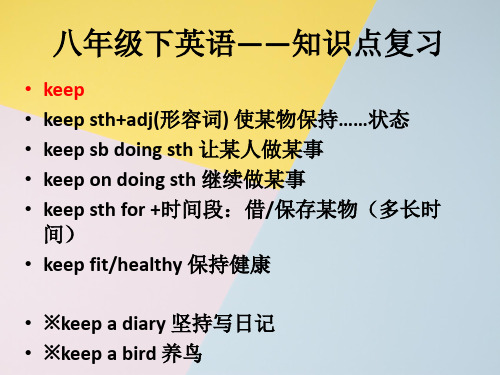
• 不定式 • learn to do sth 学会做某事 • encourage sb to do sth 鼓励某人做某事 • tell sb to do sth 告诉某人要做某事 • tell sb not to do sth 告诉某人不要做某事 • invite sb to do sth 邀请某人做某事 • invite sb not to do sth 邀请某人不做某事 • decide to do sth 决定做某事 • decide not to do sth 决定不做某事 • have to 必须don’t have to 不必 • try to do sth 尽力做某事 • try not to do sth 尽力不做某事
• so/such:如此…… • 用法如下: • such+名词短语 • so +形容词 • so many/much/few/little
• 一点儿 • a little 一点儿(修饰不可数名词和形容词) • a bit 一点儿(后接形容词) •
•
• put • put out 熄灭 • put on 穿上 • put off 下车 • put up 挂起、张贴 • put down 放下
八年级下英语——知识点复习
• keep • keep sth+adj(形容词) 使某物保持……状态 • keep sb doing sth 让某人做某事 • keep on doing sth 继续做某事 • keep sth for +时间段:借/保存某物(多长时
间) • keep fit/healthy 保持健康
• either…or…或者……或者……,连接两个主语时,谓 语动词在数的方面与or后面的主语保持一致。
期末Units1-10单元知识点总结 人教版八年级英语下册
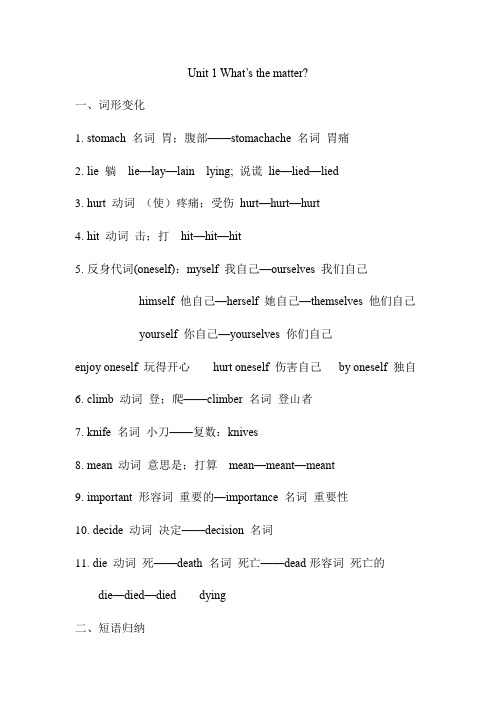
Unit 1 What’s the matter?一、词形变化1.stomach 名词胃;腹部——stomachache 名词胃痛2.lie 躺lie—lay—lain lying; 说谎lie—lied—lied3.hurt 动词(使)疼痛;受伤hurt—hurt—hurt4.hit 动词击;打hit—hit—hit5.反身代词(oneself):myself 我自己—ourselves 我们自己himself 他自己—herself 她自己—themselves 他们自己yourself 你自己—yourselves 你们自己enjoy oneself 玩得开心hurt oneself 伤害自己by oneself 独自6.climb 动词登;爬——climber 名词登山者7.knife 名词小刀——复数:knives8.mean 动词意思是;打算mean—meant—meant9.important 形容词重要的—importance 名词重要性10.decide 动词决定——decision 名词11.die 动词死——death 名词死亡——dead形容词死亡的die—died—died dying二、短语归纳1.lie down 躺下to one’s (my/his/her...) surprise 令某人惊讶的是2.take one’s (my/your/his/her..) temperature 量体温3.take a break = take breaks 休息take a risk = take risks冒险4.run out 物做主语:The money ran out. 钱用光了。
run out of 人做主语:I ran out of money. 我用光了钱。
5.make a decision = make decisions 做决定6.be in control of 掌管He is in control of the company. 他掌管公司。
初中英语 人教版八年级下册期末总复习(讲练+习题含答案,共104张PPT)
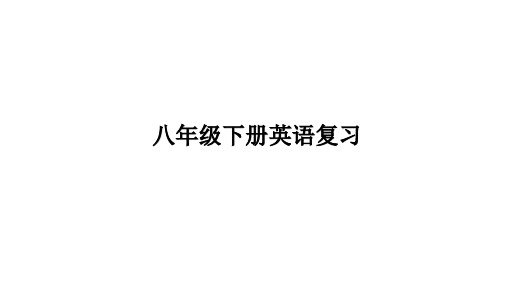
3. I think there will be more / less pollution. 我认为将会有更多/更少的污染。
fewer与less及more表数量的用法。
(3)many“许多”,修饰可数名词。 much“许多”,修饰不可数名词。
many / much比较级、最高级为不规则变化:many / much-more-most
“a few”表示“一些”+可数名词
例:a few days ago, for a few weeks, He has few friends here. There will be fewer trees.
3. I think there will be more / less pollution. 我认为将会有更多/更少的污染。
He went home after two days. 他两天后回家了。 Three years later,she had a baby. 三年后,她生了一个婴儿。
fall in love with 爱上… fall in love with a girl 爱上一个女孩 fall in love with a country 爱上一个国家
例:I have many magazines. She has more magazines. But he has the most. There will be more people on the earth in future. More and more students start to exercise more every day to keep fit.
典例展示 2.About Pollution
Tina: There is much pollution around us.
人教版八年级下册英语期末复习:重要语法知识点+重点词汇用法辨析
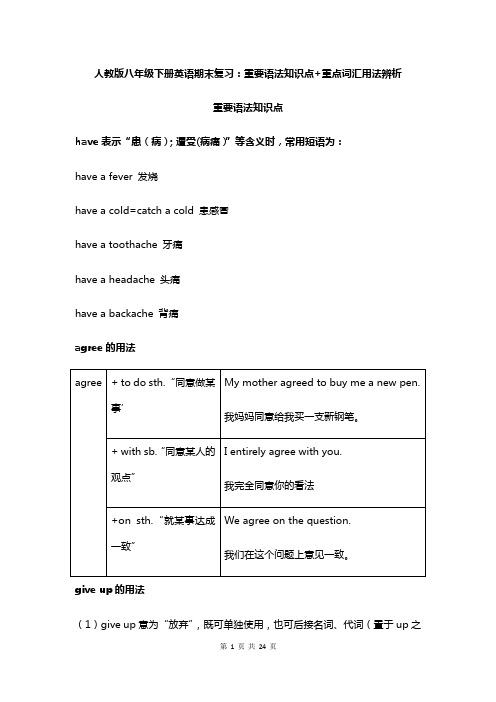
人教版八年级下册英语期末复习:重要语法知识点+重点词汇用法辨析重要语法知识点have表示“患(病);遭受(病痛)”等含义时,常用短语为:have a fever 发烧have a cold=catch a cold 患感冒have a toothache 牙痛have a headache 头痛have a backache 背痛agree的用法give up的用法(1)give up意为“放弃”,既可单独使用,也可后接名词、代词(置于up之前)或动词-ing形式。
(2)give 词组小结give out 分发;放出(气味、光、热等)give away 捐赠;赠送give in让步;屈服give back 归还make it+adj.+for sb.to do sth.句型make it+adj.+for sb.to do sth.表示“使得某人做某事……”。
其中,it是形式宾语,真正的宾语是to do sth.。
The Internet makes it possible for many people to shop at home.互联网使得很多人在家购物成为可能。
put off的用法put off意为“推迟”,既可单独使用,也可后接名词、代词(置于off之前)或动词-ing形式。
We may put off going to the park.我们可能推迟去公园。
拓展put的相关短语put out熄灭;伸出put down 记下;写下put up 张贴;举起put through 完成put on 穿上put away 收起来语法点1-动词不定式语法点2-动词短语情态动词could的用法neither的用法-Mary doesn't like action movies.玛丽不喜欢动作片。
-Me neither./Neither do I.我也不喜欢。
Neither of us is wrong.我们两个都没错。
初二下册英语期末考试重点内容人教版
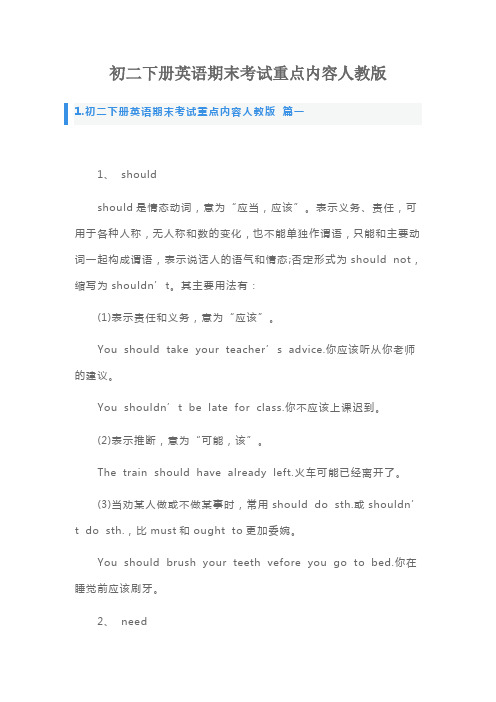
初二下册英语期末考试重点内容人教版1.初二下册英语期末考试重点内容人教版篇一1、shouldshould是情态动词,意为“应当,应该”。
表示义务、责任,可用于各种人称,无人称和数的变化,也不能单独作谓语,只能和主要动词一起构成谓语,表示说话人的语气和情态;否定形式为should not,缩写为shouldn’t。
其主要用法有:(1)表示责任和义务,意为“应该”。
You should take your teacher’s advice.你应该听从你老师的建议。
You shouldn’t be late for class.你不应该上课迟到。
(2)表示推断,意为“可能,该”。
The train should have already left.火车可能已经离开了。
(3)当劝某人做或不做某事时,常用should do sth.或shouldn’t do sth.,比must和ought to更加委婉。
You should brush your teeth vefore you go to bed.你在睡觉前应该刷牙。
2、need(1)need作实义动词,意为“需要,必然”,有人称、时态及数的变化。
sb./sth.需要某人/某物need+ to do sth.需要做某事doing需要(被)做He needs some help.他需要些帮助。
You didn’t need to come so early.你不必来这么早。
The flowers need watering.花需要浇水。
(2)need也可作情态动词,意为“需要,必须”,没有人称、数和时态的变化,后接动词原形,多用于否定句和疑问句中。
He need not go at once.他不必立刻走。
Need he go at once?他必须立刻走吗?用must提问的句子,其否定回答常用needn’t。
—Must he hand in his homework this morning?他必须今天上午交作业吗?—No, he needn’t.不,不必了。
人教版八年级下册英语复习知识点(实用7篇)

人教版八年级下册英语复习知识点(实用7篇)人教版八年级下册英语复习知识点(1)Could you please clean your room?关于to 的短语总结have to do 不得不/必须做某事need to do 需要做某事hate to do 讨厌做某事like to do 喜欢做某事want to do 想做某事love to do 热爱做某事forget to do 忘记做某事start to do 开始做某事begin to do 开始做某事ask sb to do 请某人做某事---Could you please clean your room?---Yes, / Sorry, I can' I have to do my homework---Could I please use the car?/ / Of / No, you can' I have to go在表示请求帮助或请求允许的疑问句中,常用could 代替can,以表示礼貌,委婉或不确定的语气,而can 则不具备这些语气。
这种情况下不能把cou ld 看作can 的过去式。
以上两句中用could 是为了表示礼貌的请求。
表示请求帮助或请求允许时,除了can, could 之外,还可以用may,句子的表达方式也各有不同,可以用不同的方式来表示同一个概念。
例:Could / Can / May I use your car for a day?作允答可以各种各样:如同意可以说Yes,或Sure 或Certainly,还可说Yes, (do) 或Of (y ou may / can). 或That's OK / all如果不同意,可以说I'm sorry you can' 或I'm really sorry, but I ha ve to use it 要避免说No, you can' 这样显得很不礼貌。
人教版八年级下册英语必考知识点梳理(期末复习必备)

人教版八年级下册英语必考知识点梳理(期末复习必备)八年级下册英语知识点Unit 1 What’s the matter?【重点短语】1.have a fever 发烧2.have a cough 咳嗽3.have a toothache 牙疼4.talk too much 说得太多5.drink enough water 喝足够的水6.have a cold 受凉;感冒7.have a stomachache 胃疼8.have a sore back 背疼9.have a sore throat 喉咙痛10. take risks 冒险11.hot tea with honey 加蜂蜜的热茶12.see a dentist 看牙医13.get an X-ray 拍X 光片14.take one’s temperature 量体温15.put some medicine on sth. 在……上面敷药16. give up 放弃17. sound like 听起来像18. all weekend 整个周末19. in the same way 以同样的方式20. go to a doctor 看医生21. go along 沿着……走22. on the side of the road 在马路边23. shout for help 大声呼救24. without thinking twice 没有多想25. get off 下车26. have a heart problem 有心脏病27. to one’s surprise 另某人惊讶的是28. thanks to 多亏了;由于29. in time 及时30. make a decision 做出决定31. get into trouble 造成麻烦32. right away 立刻;马上33. because of 由于34. get out of 离开;从……出来35. keep on doing sth. 继续或坚持做某事36. put a bandage on sth. 用绷带包扎37. fall down 摔倒38. feel sick 感到恶心39. have a nosebleed 流鼻血40. cut his knee 割伤他的膝盖41. put her head back 把她的头向后仰42. have problems breathing 呼吸困难43. mountain climbing 登山运动44. be used to doing sth. 习惯做某事45. run out (of) 用完;用尽46. so that 以便47. so...that... 如此……以至于...…48. be in control of 掌管;管理49. in a difficult situation 在闲境中【重点句型】1. What's the matter with you?= What'the trouble with you? = What's wrong with you? 你怎么了?2. What should she do? 她该怎么办呢?3.Should I take my temperature? 我应该量一下体温吗?4.You should lie down and rest. 你应该躺下休息一会儿。
- 1、下载文档前请自行甄别文档内容的完整性,平台不提供额外的编辑、内容补充、找答案等附加服务。
- 2、"仅部分预览"的文档,不可在线预览部分如存在完整性等问题,可反馈申请退款(可完整预览的文档不适用该条件!)。
- 3、如文档侵犯您的权益,请联系客服反馈,我们会尽快为您处理(人工客服工作时间:9:00-18:30)。
Unit1一、重点词汇、句型(unit1)1.询问身体不适:what’s the matter (with sb)?\ What’s the trouble (with sb)?What’s wrong with sb?注意:用于询问某人有什么病或某人遇到什么麻烦、问题。
其后接对象时,与介词with 2.诉说身体不适:1)have/has a+部位+ache表示身体某部位疼痛(stomachache胃痛/toothache牙齿痛/headache头痛)2).have/has a sore+部位.表示身体某一部位酸痛.(a sore back背痛/sore throat喉咙痛/sore eyes眼痛)3)have/has a +疾病.表示患某种疾病(have/has a cold感冒/fever发烧/cough咳嗽)4)形容词性物主代词+hurt/cut/break/hit+具体部位(your neck hurt你的脖子受伤,cut his knee砍到他的膝盖,break his leg摔断他的腿) 5)hurt/cut+反身代词(cut myself,)6)某人be ill=be sick生病(she is ill=she is sick.)某人don't feel well.某人感到不舒服.3.给出建议:表示建议句型1)肯定句:should应该/could可以/had better最好+动词原形否定句:shouldn’t不应该/couldn’t不可以/had better not最好不+动词原形2)Why don’t you=why not+动原,为什么不...?4.对身体不适提出建议短语lie down and rest 躺下并休息(lie---过去式lay---过去分词lain,现在分词lying)take breaks=take a break=have a rest休息take one’s temperature量某人的体温get an X-ray照X光,get some sleep睡觉drink more water多喝水Put some medicine on it上药(注意:medicine药,是不可数名词)go to a doctor=see a doctor看医生,see a dentist看牙医二、其他单词和短语1.shout for help大喊呼救P32.shout back大喊回P193.to one’s surprise另某人惊讶的是surprise名词in surprise吃惊地,形容词be surprised P34.thanks to幸亏,由于P3 ,与to有关的短语belong to属于P62,close to接近P70,搭配:某地be close to某地,某地与某地接近up to+数字,到达(数量,程度)P53be used to doing sth习惯做某事P6 ,搭配:Aron is used to taking risks.Aron习惯冒险used to do sth过去常常做某事P105.have problem doing sth做某事有问题P6,同义短语have trouble/difficulty doing sth做某事有困难/麻烦。
6.in a very dangerous situation处于危险境况P67.be in control of掌控,管理7.cut off切断P6,搭配cut off half his right hand切掉右手的一半。
相似短语cut out删除P30,搭配:cut out a few their activities删除一些他们的活动。
三、重点语法(反身代词)1.构成:第一人称、第二人称形容词性物主代词+self或selves,第三人称代词宾格+self或-selves,意“本人,本身”第一人称:myself我自己ourselves我们自己第二人称:yourself 你自己yourselves你们自己第三人称:himself他自己/herself她自己/itself 它自己themselves 他们自己搭配look after oneself / take care of oneself照顾自己teach oneself sth/ learn sth by oneself自学enjoy oneself 玩得高兴,过得愉快help oneself to sth 请自用…(随便吃/喝些).hurt oneself摔伤自己leave sb. by oneself把某人单独留下作文(unit1关于健康话题)How to keep healthyHow can we keep healthy? Here is some useful advice.First, we should do more exercise. Second, we should have a good eating habit. We should eat more vegetables and fruits, and try to eat less junk food. Finally, enough sleep is also very important. We should go to bed early so that we can get enough sleep.Health is the most important in our life. We should try our best to keep healthy. Health is good for our study and development.书面表达拓展话题:疫情As we all know, Because of Novel-coronavirus, we Chinese have had a special Spring Festival. Nobody wants to get the illness, but how should we prevent NCP and protect ourselves? Here is my advice about how to keep healthy.First, we should try not to go outdoors and we should avoid going to the places where there are many people. Second, whenever we go out, we should wear antiseptic masks. They can protect us from catching the illness. And then, we should develop a habit of washing our hands. Last but not least, we should drink more water, have more rest and do proper sports at home, which will certainly make us stronger.All in all, I am sure we can keep healthy if we follow the advice above.Unit2一、重点词汇句型(unit2)1.动词短语(如果人称代词放中间,且用宾格)1).cheer sb up(sb用宾格)使某人高兴起来P9give up放弃搭配:don’t/never give up不放弃clean up打扫干净搭配:clean up the city park打扫干净城市公园P9put up举起,张贴搭配:put up signs张贴广告P12call up sb打电话给某人P12fix up+某物=repair 某物修理某物P13set up建起,设立,搭配:set up this group to help disable people建起这组织帮助残疾人P14 come up with提出,搭配:come up with plans/ideas提出计划/主意P10Pick up捡起,摘,接某人搭配:pick up the phone=answer the phone接电话P34wake up醒着反义词be asleep=fall asleep睡着P35,反义词be awake醒着hurry up匆忙,赶快,P58 固定搭配:hurry up,or you will be late赶快,否则要迟到了。
2)put off推迟,固定搭配:put off the meeting推迟会议put up举起,张贴put down放下get off下车P3,反义词:get on上车cut off切断P6 搭配cut off half his right hand切掉右手的一半go off(闹铃)发出响声P34,搭配:my alarm go off闹铃发出响声。
3)give out分发(食物,救助物资)P9,搭配:give out the food分发食物hand out分发(纸张、广告、作业等)P12 搭配:hand out notice分发布告run out耗尽,用尽搭配:I run out of water.我用尽水get out of从...中出来,离开搭配:get out of the difficult situation从困难的境况中出来clear out清理干净P75 搭配:clear out a lot of things清理赶紧很多东西check out查看,观察P74take out the rubbish倒垃圾work out解决,成功地发展,搭配:hope things work out希望事情成功地解决try out参加...选拔搭配:try out for a volunteer参加志愿者选拔4)give away捐赠搭配:give it away捐赠给它P13give up放弃give out分发(食物,救助物资)P9give out of离开,从...出来2.本单元易混词1)alone独自P12 搭配:I want to travel alone.我想独自旅行。
lonely孤独的P10 搭配:a lot of old people are lonely.很多老人孤独的。
2)raise募集P12 搭配:raise money募集钱rise升起,增加P35 过去式rose,过去分词risen 搭配:the sun rises.太阳升起。
